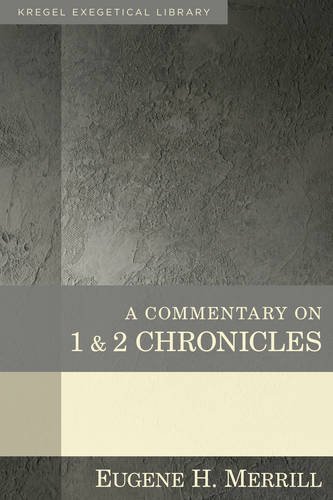Reviewed by Edgar Johnston
The commentary is another exciting new work by Eugene Merrill, professor emeritus of Dallas Theological Seminary.
In addition to the commentary proper and the introductory section, Merrill has given us a whole list of useful charts:
- “The Might Men of David”
- “Holy War Technical Terms”
- “Levitical Temple Officials”
- “Occurrences of Primary Technical Terms of Covenant in Deuteronomy,” et al.
He has also provided brief excurses scattered throughout the volume:
- “The Chronicler’s Literary Sources and Their Individual Ideological and Theological Significance”
- “The Travels of the Ark of the Covenant”
- “The Angel of YHWH”
- “David and Royal Sonship”
- “Old Testament Historiography”
- “The Identify of the Scroll in Josiah’s Reformation” et al.
The author says the purpose of the Chronicler “was to provide a theological interpretation of Israel’s past interlaced with great hope for an eschatological renewal of the Davidic house, one bound to Yahweh its God by an indissoluble new covenant” (p. 46). The overriding genre is narrative but has many “subsidiary forms in which the complexity of the historical/theological traditions can be laid out and clarified” (p. 47). This includes the extensive use of genealogies in chapter 1-9. He unfolds this theology of Chronicles in the introduction (57-68) under the headings, The House of David, The Renewed Covenant, and, The Restored Temple.
Since we can’t cover many of valuable theological issues raised by Merrill, I want to mention three areas Merrill develops as he interprets the book of Chronicles:
Genealogies
Merrill notes that ignoring these genealogies is all too common and amounts to a de-canonizing of this part of the Old Testament. In fact, they have everything to do with salvation history: “The importance of the genealogies of Chronicles lies fundamentally in connecting later persona and events in sacred history to the roots from which they sprang” (144). Not only do they connect the History of Israel to the creation of the world (Israel is part of world history), but also constitutes a “theological signal that David and his connection to the temple and its institutions will loom large in the Chronicler’s full treatment” (145). To this he adds an important warning to us all: “Without an understanding of the Chronicler’s messianic hope and promise, not only are the genealogies without existential meaning but the entire narrative of redemption history ceases to have significance. The genealogies, then, are the skeletal framework upon which the fleshed-out program of human redemption is made coherent and relevant” (145).
Treatment of David and Solomon (244, 248, 251)
It is, of course, well known, that the Chronicler, in some sense, idealizes David and Solomon, leaving out a “litany of stories that muddy David’s reputation” (244). This includes David’s adultery and murder of Uriah, Bathsheba’s Hittite husband, who is more righteous than David. For Solomon he leaves out the great apostasy of Solomon. So why is this? Why is he idealizing these two kings? Why for instance, does he include the “dismal account of David’s reliance on military might, rather than upon Yahweh” (244)? 1 Chronicles 21 is replete with the central themes of the Chronicler’s theology. For one thing (citing Klein) “it is not that David is sinless that makes him a model, but rather that this great sinner, who trusted in the exceedingly great mercies of God, confessed his sin and followed through on divinely prescribed obligations of repentance” (248). Compare Knoppers, 1 Chronicles 10-29 (764). “Close scrutiny of this chapter reveals …compelling reasons to recognize an additional dimension of the Davidic legacy…the image of David as the model of a repentant sinner is a constituent element in the depiction of this king.”
The End
The announcement of Cyrus. What was the significance of “his decree to release all captive peoples to return to their home countries” (610)? The Jews were “given a new opportunity to reconstitute themselves as the people chosen by Yahweh to fulfill their destiny of being a light to the Gentiles. This addition at the end of the book leaves no doubt about the future. This was “the beginning of a more full-blown eschatological and messianic community” (612).
Merrill has done the church a great service with this excellent commentary. It will delight unknown generations of pastors and laymen as they strive to understand and obey the Word of God.
Edgar Johnston is professor of Bible at Center for Urban Theological Studies (CUTS) in Philadelphia.
Buy the books

A Commentary on 1 and 2 Chronicles